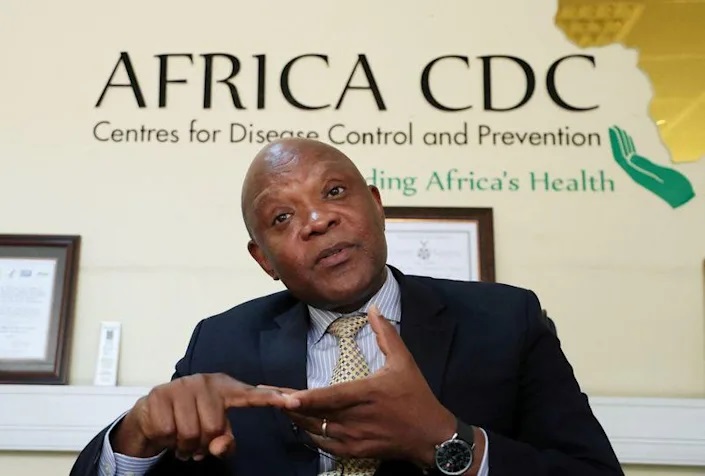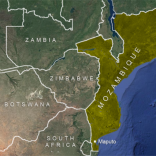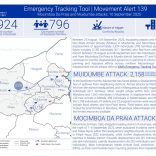Mozambique: Chronic malnutrition, food insecurity levels continue - NGO
Watch: Mozambique comes third among African countries administering Covid-19 vaccines – CDC

FILE PHOTO: John Nkengasong, Africa's Director of the Centers for Disease Control, speaks during an interview with Reuters at the African Union Headquarters in Addis Ababa
Mozambique has the third highest percentage of vaccines administered among all African countries, with 27.2% of the population having received 18.9 million doses, according to the African Union Centre for Disease Control and Prevention (Africa CDC).
According to data made available following the Africa CDC’s weekly press conference, the African vaccine table is led by South Africa, which has used 91.5% of the 29 million vaccines received, followed by Morocco, which has used 90.5% of its 53.6 million vaccines.
“In total, 2.8 million vaccines were wasted because the deadline had expired, and, according to press reports, one million doses were wasted in Nigeria because they arrived on a very short deadline,” Africa CDC director John Nkengasong told the weekly virtual press conference from Addis Ababa.
“We have to make every effort to avoid wasting vaccines. When I was at a vaccine factory in South Africa in May, and I had the vaccine in my hand, and I thought, this is a life that can be saved. It was an emotional moment, and extrapolating that little vial to the thousands of vaccines expiring, it hurts, because it’s a life that can’t be saved,” Nkengasong said.
The 2.8 million expired vaccines represent 1% of all vaccines received, but even this small percentage is excessive.
“Any expired vaccine is a vaccine that could have saved someone. We should launch a campaign with the objective of zero waste, so that every vaccine that arrives at the airport ends up in someone’s arm,” he concluded.
Mozambique already has enough vaccine doses to immunize the entire adult population, the target announced by the country’s president, Filipe Nyusi, on Wednesday.
“We already have enough vaccines for the entire eligible population” of about 16 million people, he said during an address to the nation about disease prevention measures.
“So, in the next four months, we aim to reach the goal of vaccinating about five million more people across the country,” the president added.
The head of state said that Mozambique served as an example for the rest of Southern Africa, as it had already reached half of its target.
According to the latest figures, at least 10.3 million adults in Mozambique have had one dose, and about 8.5 million of the total adult population of about 16 million are completely vaccinated.
In total, the 55 countries on the African continent have already administered 353 million doses, which corresponds to 62% of the total available, said the director of Africa CDC, adding that this represents an overall complete vaccination rate of 10.4%.
At the press conference, John Nkengasong announced that Africa exceeded 10.4 million cases of Covid-19 in the last week, resulting in 235,000 deaths.
“The total number of cases has reached 10.4 million in the 55 member states of the African Union, unfortunately resulting in 235,000 deaths since the beginning of the Covid-19 pandemic,” Nkengasong said.
Analysing the trend of the last week compared to those before, the official said that there were 46 countries in the fourth wave, and eight in the fifth wave, including Guinea-Bissau, along with Kenya, Somalia and Tunisia and others.
“Comparing the week January 10th and 16th with the week of January 3rd to 9th, there were a total of 249,943 new cases, which represents a decrease of 20%,” said Nkengasong, stressing that, in terms of the number of deaths, there was an average increase of 4% in this period, with 2,791 new deaths compared to the 2,688 registered the previous week.
The Omicron variant had already been registered in 40 countries on the continent, Nkengasong concluded.
Mozambique had, by Wednesday, recorded a total of 2,140 Covid-19 deaths among 220,908 confirmed cases, of which 88% are deemed fully recovered, and with 140 patients still currently hospitalized.
Covid-19 has caused 5,553,124 deaths worldwide since the beginning of the pandemic, according to the latest report by the Agence France-Presse.
The respiratory disease is caused by the SARS-CoV-2 coronavirus, detected in late 2019 in Wuhan, a city in central China.
The new ‘Omicron’ variant, classified as worrying and very contagious by the World Health Organization (WHO), was first detected in South Africa and, since the health authorities there raised the alert in November, has become the dominant variant in many countries, including Portugal.












Leave a Reply
Be the First to Comment!
You must be logged in to post a comment.
You must be logged in to post a comment.